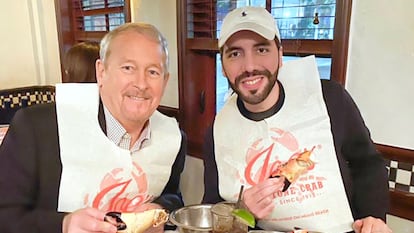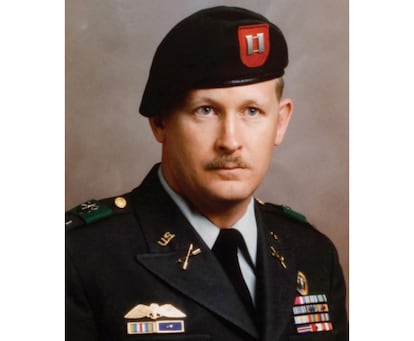The Salvadoran trail of Ronald Johnson, Trump’s man for Mexico
The retired colonel’s tenure as ambassador to El Salvador lasted less than two years, but it was enough for him to forge a personal friendship with President Nayib Bukele. During the country’s civil war in the 1980s, he led combat and counterinsurgency operations

Nayib Bukele had mixed emotions. He smiled as he stood for official photographs, but the Salvadorian president admitted he was filled with sadness and nostalgia. “A great friend is leaving,” Bukele declared on January 18, 2021, at the farewell ceremony he organized for Ronald Johnson, the U.S. ambassador. Just two days before Johnson was set to leave, Bukele honored him with the National Order José Matías Delgado, Grand Cross Silver Plate — one of the highest decorations in El Salvador. At the same event, Johnson also became the first recipient of the newly created Grand Order Francisco Morazán, an insignia specifically designed to commemorate his brief stay of less than two years.
“After nearly 50 years of service to the government, I can say this has been the greatest honor of my professional life,” said Johnson, visibly moved by the accolades. Almost four years later, Donald Trump has once again turned to the retired colonel, former Green Beret, and CIA veteran for a new mission: to serve as his envoy in Mexico, a critical frontline for U.S. interests in Latin America.
“Distinguished people, my name is Ronald Johnson, and I am the new United States ambassador to El Salvador,” the former military officer announced in Spanish, his American accent unmistakable, in a video recorded in September 2019, days before his arrival. Bukele had assumed office just three months earlier, and Trump sought a strongman to address two pressing concerns: keeping gangs such as MS-13 and Barrio 18 in check and curbing the flow of migrants to the U.S. Despite referring to El Salvador in 2018 as a “shithole” country — a comment he later denied — Trump was uneasy about Bukele’s occasional overtures toward China.
Although Johnson had no prior diplomatic experience, his decade-long military service and 20 years in intelligence appealed to Trump, who wanted him to act as his “eyes and ears” in the region. Upon arrival, Johnson wasted no time aligning himself with the Salvadoran president. “My priorities are the same as those of President Bukele’s administration: more security, more prosperity, and more opportunities for everyone,” Johnson proclaimed in his first message to Salvadorans. Bukele reciprocated the sentiment on Twitter: “Our priorities are the same, and that is why we will achieve great things together.”
The close relationship raised eyebrows. Rubén Zamora, a former Salvadoran ambassador to Washington, wrote in a 2020 column for El Faro: “You are dealing with a government that does not express friendship, but rather submission.”
This wasn’t Johnson’s first time in El Salvador. During the country’s civil war, he led combat operations as part of the U.S. Army and was one of 55 advisors who developed strategies against the insurgency in the 1980s. Upon his appointment as ambassador, Zamora remarked on the unusual nature of the choice. “Over the past 60 years, more than 80% of U.S. ambassadors to our country have been career diplomats. Johnson is the only one from the Army and CIA,” he noted — a fact that also caught attention in Mexico this week.

“Prior to his arrival, the bilateral relationship had been very tense, there was a cooling off,” says Salvadoran Óscar Chacón, spokesman for Alianza Américas, a network of migrant organizations in the United States. Johnson’s predecessor, Jean Manes, had encountered several political frictions, particularly with the leftist Farabundo Martí National Liberation Front (FMLN). “Johnson, on the other hand, is an extremely pragmatic man, and that was one of the main reasons behind his appointment,” Chacón explains.
According to Chacón, Johnson’s primary directive was to repair strained relations and ensure El Salvador’s alignment with U.S. priorities, given its role as a major source of migration. “I see Johnson as a person who came to say ‘look, I’m coming to restore the traditional custom of American ambassadors, if you align yourself with my interests and priorities, I’m going to give you the support you need and that includes participating in all the social activities where you need me,’” he explains.
Bukele quickly understood the message. Soon after Johnson’s arrival, the Salvadoran government announced the formation of a new border patrol — a localized adaptation of the U.S. Border Patrol — dedicated exclusively to curbing illegal migration. The government also signed the Asylum Cooperation Agreement (ACA), which mandated that Salvadoran migrants seeking asylum in the U.S. be deported back to El Salvador to process their applications there.
Johnson quickly became a key ally of Bukele’s administration, making frequent appearances at press conferences, work meetings, and even private events. “We have an alliance with the United States,” Bukele stated shortly after Johnson’s appointment in 2019. “But I believe that with Ambassador Johnson and his wife, Alina, we will have a personal friendship,” he added prophetically.
Officially, Johnson won the trust of Salvadoran authorities by consistently praising Bukele’s policies prior to the controversial regime of exception. He commended efforts to arrest and extradite gang members, reduce crime rates, and tackle organized crime. Johnson claimed migration had decreased by “81%” in 2020, downplaying the role of the pandemic and El Salvador’s strict confinement policies — figures that experts like Chacón called “capricious.” While international organizations raised concerns about human rights violations, Johnson largely ignored them and advocated for El Salvador to be considered a country that “respects freedoms,” ensuring the continuation of U.S. assistance funds. “The relationship has been revitalized,” he wrote in an opinion piece marking his first year in office.
“He was very media-savvy, and every time Johnson opened his mouth, it was to support Bukele,” says Óscar Martínez, editor-in-chief of El Faro. “He also posted photos with him and allowed Bukele to post photos of them together in unusual scenarios for an ambassador, like eating lobster or riding a boat.” Bukele reciprocated, publicly emphasizing their camaraderie. Before Christmas 2019, the president shared a photograph of the two dining on lobster in Miami, and in January 2020, he posted another photo of their families vacationing at the Jaltepeque estuary.
This close friendship enabled Johnson to downplay criticism of Bukele’s authoritarian tendencies. For instance, four months after Bukele used heavily armed military personnel to take over Congress — ostensibly to pressure lawmakers into approving a loan for his security plans — Johnson not only avoided talking about the incident, he changed the subject by focusing on their friendship. “Everyone asks me about our friendship. President Bukele and his family are my friends. We don’t agree on everything, but if you have a friend who agrees with you on everything, you need to find a new friend,” Johnson remarked.
Martínez says that Johnson remained a staunch ally, even as El Faro and other media outlets exposed Bukele’s alleged pact with gangs. While Bukele denied the accusations, Johnson downplayed the controversy, asserting that the priority was reducing crime. Martínez argues that the affinity between them was obvious, even in their public personas. “Johnson wanted to project the image of a strongman, of a former CIA agent, of someone who shared photos of himself riding motorcycles on vacation,” he recalls. “And Bukele often posed flanked by soldiers, blending military imagery with religious undertones. In that, they were quite alike.”
But their alliance was short-lived. Sixteen months into Johnson’s tenure, Joe Biden assumed the U.S. presidency, reinstated Jean Manes as ambassador in El Salvador, and reversed many of Bukele’s concessions. In 2021, Washington added 13 Salvadoran officials — including close Bukele allies like Supreme Electoral Tribunal magistrates and former Cabinet ministers — to the Engel List, which identifies individuals linked to corruption. At the height of tensions, Johnson recorded a Christmas message congratulating Bukele and his family. Reflecting on his tenure, he remarked: “Those were times when ambassadors were sent to strengthen relations between nations,” taking a thinly veiled jab at his successor. Manes left El Salvador in November 2021, lamenting that the Bukele government was “showing no interest” in improving the relationship.
“Together, we will put an end to migrant crime, stop the illegal flow of fentanyl and other dangerous drugs into our country and, make America safe again,” Donald Trump said when announcing Johnson’s nomination as ambassador to Mexico — a post that still requires Senate confirmation. Much attention has been given to Johnson’s expertise in security and intelligence, particularly in combating drug trafficking and terrorism. Yet Chacón argues that Mexico should also focus on other lessons from his time in El Salvador. “Pragmatism is a defining trait of his profile, and that’s something Mexico should take into account,” Chacón observes. “His pragmatism is not tied to ideological paradigms, even if he believes in them.”
Sign up for our weekly newsletter to get more English-language news coverage from EL PAÍS USA Edition
Tu suscripción se está usando en otro dispositivo
¿Quieres añadir otro usuario a tu suscripción?
Si continúas leyendo en este dispositivo, no se podrá leer en el otro.
FlechaTu suscripción se está usando en otro dispositivo y solo puedes acceder a EL PAÍS desde un dispositivo a la vez.
Si quieres compartir tu cuenta, cambia tu suscripción a la modalidad Premium, así podrás añadir otro usuario. Cada uno accederá con su propia cuenta de email, lo que os permitirá personalizar vuestra experiencia en EL PAÍS.
¿Tienes una suscripción de empresa? Accede aquí para contratar más cuentas.
En el caso de no saber quién está usando tu cuenta, te recomendamos cambiar tu contraseña aquí.
Si decides continuar compartiendo tu cuenta, este mensaje se mostrará en tu dispositivo y en el de la otra persona que está usando tu cuenta de forma indefinida, afectando a tu experiencia de lectura. Puedes consultar aquí los términos y condiciones de la suscripción digital.








































